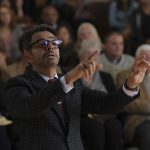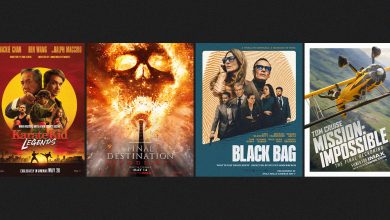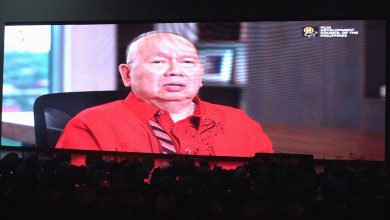MANILA, PHILIPPINES — Learning sign language is literally learning a completely new way of communicating. The representation of deaf people on TV and movies has been painfully small over the decades, when they are eventually shown, they often surprise audiences with how good the stories are about them. When a child is born into a family with parents who cannot hear or speak, the child goes through an experience that few can relate to. That is the story behind the critically-acclaimed film CODA.
Ruby Rossi (Emilia Jones) is the only speaking member of her family. Dad Frank (Troy Kotsur), mom Jackie (Marlee Matlin), and brother Leo (Daniel Durant) are all deaf and the family operates a fishing business out of Gloucester, Massachusetts. Ruby plans on joining the family business full-time after finishing high school.
Viewed as an outcast at school because of her family situation, Ruby sees her crush, Miles (Ferdia Walsh-Peelo) sign up for choir auditions. She also signs up for choir and meets the instructor, Bernardo “Mr. V” Villalobos (Eugenio Derbez). Ruby panics, however, when Mr. V calls on her to sing “Happy Birthday to You” in front of everyone.
Ruby is a CODA, a child of deaf adults, and it isn’t an easy responsibility to bear. Returning later to Villalobos, Ruby explains how she was bullied as a child for talking funny. He is pleasantly surprised when he hears her sing, then pairs Ruby with Miles for a duet at their choir recital.
Meanwhile, Frank and Leo are struggling to keep their business afloat due to new sanctions imposed by the local board. Frank stands up during a board meeting to tell everyone that he’ll start his own company to sell fish on his own.
Even as Villalobos trains Ruby and encourages her to audition for the Berklee College of Music, it comes into conflict with her family obligations as the only hearing person on their boat.
It’s been 36 years since Matlin exploded onto the scene with her Academy Award-winning performance in Children of a Lesser God. Only 21 when she won her Best Actress Oscar, Matlin has seen representations of deaf people evolve since then, often at a painfully slow pace.
When CODA was offered to Matlin and the notion of casting non-deaf actors as her co-stars was brought up, the actress told producers to count her out if that would happen. The result is having three deaf actors in Matlin, Kotsur, and Durant presenting authentic performances of deaf people as they actually are in everyday life.
Too often, when people with disabilities are shown in movies or TV shows, they are either helpless or too virtuous and virginal. In these cases, they are unrealistic because, although we don’t often see it, they are very normal people with the same faults as hearing people do.
Director and screenwriter Sian Heder presents this family with parents who are still very in love with each other (to the point that they’re having raucous sex while their daughter has a friend in the next room). Their deaf son and his hearing younger sister insult each other like regular siblings do on a daily basis.
This is not a perfect family by any means, and their sometimes dependence on Ruby because she can hear often leaves her weighed down by these responsibilities. She has sacrificed a love for singing and music because no one in her family can hear her sing. Even when she tells her mother that she’s in the choir, Jackie brushes it off because she thinks Ruby might not even sing well.
These are the scenarios that make CODA stand out from other motion pictures. The authenticity of the deaf actors interacting with a world that too often does not see or understand them does not mean they are begging for sympathy. It’s actually the opposite as what they demand is to be treated fairly like everyone else.
Emilia Jones’ star has been on the rise after starring on two seasons (and counting) of Netflix’s Locke and Key. She embodies Ruby’s burden and struggles to bridge both her deaf family and the world that she desperately wants to hear her sing.
THANK YOU SO MUCH @bafta !!!!!!
Truly honoured to receive this nomination alongside such incredible actors. This is a day I will never forget 🙌🏼 https://t.co/rtvt70pYeA— EMILIA JONES (@EmiliaJonesy) February 3, 2022
Kotsur has been reaping Best Supporting Actor awards recently, including the BAFTA, Screen Actors Guild, and Critics’ Choice Awards equivalents. Don’t be surprised if he takes home the Oscar this year for his multi-layered performance as Frank Rossi.
Congratulations to #CODA’s @TroyKotsur his Best Supporting Actor win at this years #CriticsChoiceawards 👏With the #Oscars Sunday, the #CriticsChoice are the BEST predictor of who will win @TheAcademy ⭐️🤩#criticschoice #TroyKotsur #CODAfilm pic.twitter.com/7DER4EqS6m
— Critics Choice Awards (@CriticsChoice) March 22, 2022
That is perhaps the key in watching CODA. The deaf characters in the film are presented like regular, imperfect, sexual, and quirky characters. They’re not placed on a pedestal and neither are they completely helpless individuals who cannot do anything unless guided by someone who can hear.
It is a refreshing presentation, something that these deaf actors, as well as deaf people in general, have been demanding to happen for years. Matlin first got everyone’s attention in the late 1980s. It took this long for another aspect of her existence to again draw attention. Hopefully, it won’t take so long for the world to pay attention to them again.





















